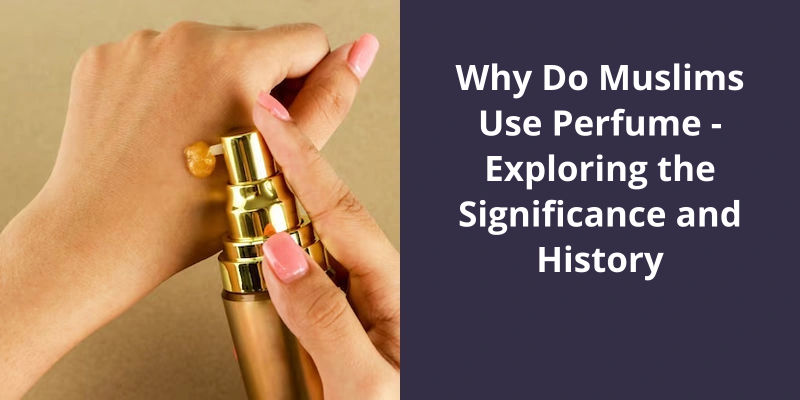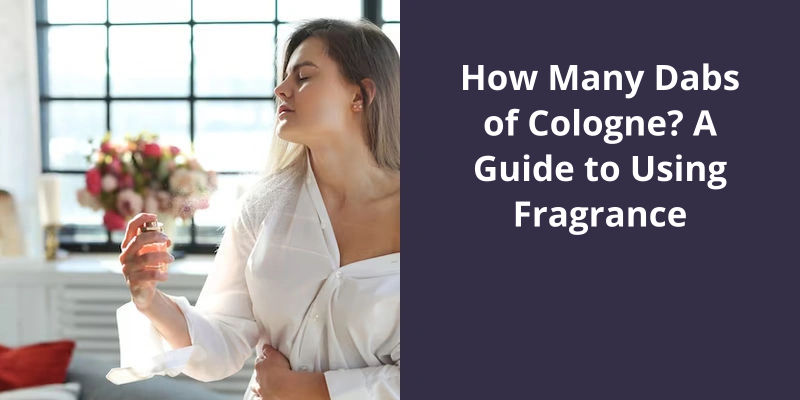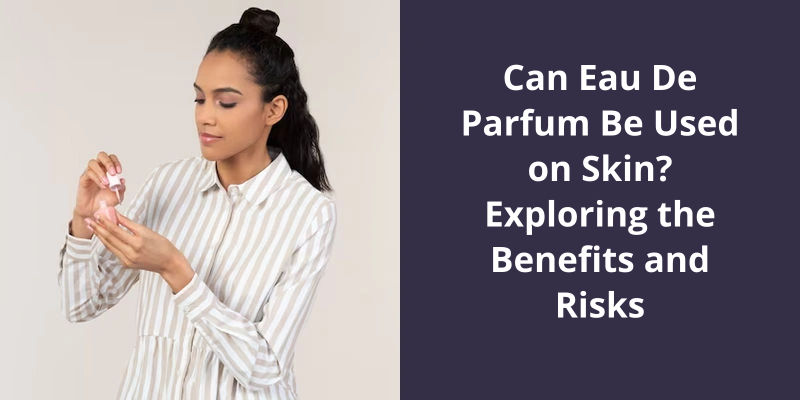Muslims use perfume due to religious and cultural reasons. The Islamic faith encourages cleanliness and smelling good as Prophet Muhammad often used fragrance and advised others to do the same. It is also said in the Hadith that one of the three things that Prophet Muhammad loved in this world was fragrance. Moreover, Muslims generally apply perfume especially before going to communal prayers. They believe this is a part of expressing respect towards others by ensuring they do not emanate bad odours. Using perfume in Islam also goes beyond physical cleanliness, it is considered as spiritual cleanliness too – a means to attract angelic presence and repel the satanic forces. Therefore, perfume has a significant presence in Muslim’s daily rituals and ceremonies. It’s not necessarily a mandatory practice, but holds a high regard in Islamic cultural norms and doctrines. The aim is to smell pleasant, evoke a sense of freshness, and establish a spiritually clean environment.

What Is the Islamic Perspective on Perfume?
Perfume has been an integral part of Islamic culture for centuries. In fact, it’s widely believed that the use of perfume has been encouraged by the Prophet Muhammad (peace be upon him) himself. Not only does this reflect the importance of personal hygiene in Islamic tradition, but it also highlights the significance of smelling good as a means of pleasing oneself and others. Perfume is seen as a way of expressing gratitude to Allah for the blessings that have been bestowed upon us.
Before praying, Muslims are required to perform an ablution called wudu, which involves washing the face, arms, and feet. The use of perfumed soap or water during this ritual is considered commendable, and it’s believed to purify the body and the soul. Similarly, during the Hajj pilgrimage, pilgrims are encouraged to apply perfume to themselves and their clothing as a sign of their devotion to Allah.
The scent of certain oils, such as lavender and rose, is said to have a calming effect on the mind and body, and many Muslims use them as a form of aromatherapy. Additionally, perfume is believed to have antiseptic properties that can help prevent the spread of diseases and infections.
The art of perfumery has a rich history in the Islamic world, with many famous perfumes originating from cities such as Damascus, Baghdad, and Cairo. Perfume-making was often seen as a highly esteemed profession, and many rulers and elites were known for their impressive collections of scents.
By following the Sunnah of the Prophet Muhammad (peace be upon him) and wearing perfume, Muslims can aspire to a more fulfilling and fragrant life, both in this world and the hereafter.
The Significance of Perfume in Islamic Weddings and Celebrations.
Perfume holds a special importance in Islamic weddings and celebrations as it’s considered a form of personal hygiene and a way to enhance one’s beauty and attractiveness. It’s also seen as a symbol of hospitality and generosity towards guests and loved ones. The use of perfume is encouraged in Islamic teachings as it’s believed to bring pleasure to both the user and those around them.
While pure perfume oils and attars are deemed halal in the Islamic faith, many modern-day perfumes cause a dilemma due to the combination of scented oils and alcohol carriers. Therefore, it’s crucial to understand what classifies as halal perfume, to make informed choices.
What Type of Perfume Is Halal?
Islamic law (Sharia) prohibits the use of alcohol in personal care products and toiletries. This includes perfumes, colognes, and other fragrant items. However, some perfumes may be considered halal if they don’t contain any alcohol and are made with pure perfume oils or attars. These oils are derived from natural sources such as flowers, herbs, and spices, and are extracted without the use of any alcoholic solvents or carriers.
Attars are traditional Indian perfumes that have been used for centuries in Islamic cultures. They’re highly concentrated perfume oils that are extracted from natural materials using traditional distillation methods. These oils are prized for their long-lasting, pure scent and are used for both personal and religious purposes. Attars are halal because they don’t contain any alcohol, and they’re considered to be a pure and natural form of fragrance.
They’re used in many different types of perfumes, including designer and niche fragrances. Many commercial perfumes also contain alcohol, which makes them haram (forbidden) in Islam.
It’s also important to research the brand and the ingredients used in the perfume to ensure that it’s halal. There are many online resources available that can help you find halal perfumes and personal care products.
How to Make Your Own Halal Perfume Using Natural Ingredients.
- Choose your desired natural ingredients such as essential oils and carrier oils. Make sure they’re halal certified.
- Mix the essential oils and carrier oils together in a glass container.
- Leave the mixture to sit for 2-3 days, allowing the oils to blend and settle.
- After 2-3 days, strain the mixture to remove any impurities.
- Pour the strained mixture into a dark glass bottle with a tight lid.
- Store your halal perfume in a cool, dark place for optimal preservation.
This Islamic practice is rooted in the belief that women should dress modestly and prevent any actions that may lead to temptation or distraction for men during religious gatherings or public interactions. Let’s take a closer look at the cultural and religious significance of perfume in Islam and how it relates to modesty and purity.
Why Is Perfume Not Allowed in Islam?
Moreover, the use of perfume in Islam is a matter of modesty and dignity. Islam teaches it’s followers to behave modestly and to avoid anything that might attract unnecessary attention. Wearing strong perfumes can violate this principle as it can attract unwanted attention and may cause distraction.
According to the teachings of Islam, cleanliness is half of faith. Therefore, it’s important to maintain personal hygiene, including grooming and the use of fragrances. However, the excessive use of perfumes and strong fragrances can become a nuisance to others. This is because some people may be allergic or sensitive to certain scents, which can lead to discomfort and respiratory problems.
The use of perfumes can lead to a desire for attention and admiration, which can lead to pride and arrogance. It can create a sense of superiority over others, which can lead to negative consequences such as greed and self-centeredness.
The History and Significance of Islamic Perfumery.
- Perfumery has been an important part of Islamic culture since it’s inception.
- The Prophet Muhammad himself is said to have used perfume frequently and encouraged it’s use.
- Islamic perfumery has a rich history and is deeply rooted in tradition and spirituality.
- Ingredients such as oud, rose, and musk have been prized in Islamic perfumery for centuries.
- Perfumes and oils are often used in Islamic prayer rituals and are considered to have spiritual and healing properties.
- Islamic perfumery has influenced the global perfume industry and continues to be an important part of the fragrance world today.
Perfume has a rich and fascinating history, with it’s usage dating back to ancient civilizations. It’s been an integral part of human culture for thousands of years, symbolizing everything from purity to social status. Let’s take a closer look at the story behind perfume, from it’s earliest beginnings to modern-day fragrance trends.
What Is the Story Behind Perfume?
The art of perfume-making can be traced back to ancient civilizations, where it was believed that fragrances had the power to evoke certain emotions and auras. The ancient Egyptians, for instance, were known for their elaborate use of fragrances in their rituals, religious ceremonies, and everyday life. They believed that perfume had magical properties and could appease the gods, ward off disease, or attract love. Thus, fragrances were considered an essential commodity in their society, and perfume-making became a highly respected and specialized craft.
Similarly, in the Roman Empire, perfume was used for both personal and social purposes. The wealthy citizens of Rome would often wear perfumes to mask unpleasant body odors and to showcase their status. They’d also use fragrances to create a romantic ambience during social gatherings and parties. The fragrances were made from a variety of natural ingredients, such as flowers, spices, and resins, and would be applied to different parts of the body for a lasting effect.
Perfume-making also played a significant role in Mesopotamia, which is considered to be one of the earliest civilizations in the world. They’d often use perfumes to treat wounds, alleviate headaches, and combat stress. The fragrances were created using various techniques, including distillation, maceration, and enfleurage, and would be stored in clay or glass bottles.
In the Persian Empire, fragrances were considered a symbol of luxury and refinement. The Persians were known for their exquisite taste in perfumes and would often use them as gifts for diplomatic purposes. They believed that fragrance had the power to enhance ones mood and elevate ones social status.
Today, the use of perfume has become an integral part of modern civilization, with a wide range of fragrances available for different occasions and moods. Perfumes are no longer just a symbol of luxury and social status, but have become a means of self-expression and creativity. The art of perfume-making has evolved over the years, with new techniques and ingredients being discovered and used. Despite all the changes, the essence of perfume-making remains the same – to evoke emotions and enhance ones personality.
The Science Behind Scent: How Do Our Noses and Brains Process and Interpret Fragrances?
- Our noses contain millions of olfactory receptors, which are specialized cells designed to detect different aromas.
- When we inhale a fragrance, it binds to these receptors, sending signals to the brain.
- The brain then processes these signals, identifying the scent and triggering a reaction.
- This reaction can include emotional responses and memories associated with certain scents.
- The science of scent is complex and ongoing research continues to uncover new information about how our noses and brains work together to process and interpret fragrances.
Source: History of perfume
The importance of cleanliness in Islam extends beyond just physical cleanliness. It includes spiritual cleanliness as well. And one way to achieve this is by wearing perfume. For Arabs, wearing perfume is more than just a way to smell good. It’s deeply rooted in their culture, tradition, and religion. Let’s explore the significance of perfume in Arab culture and why it continues to hold such importance even today.
Why Do Arabs Wear Perfume?
Therefore, the use of perfume among the Arab community goes beyond simply smelling good. It’s a cultural and religious practice that’s deeply ingrained in their daily lives. In fact, wearing perfume is considered a part of the overall hygiene routine in many Arab households. It’s believed that smelling good enhances ones personal hygiene and helps to maintain a positive image among peers and society.
In recent years, the Arab perfume industry has grown significantly, with many high-end perfume brands now catering to Arab tastes and preferences. However, there are also many lighter and more modern fragrances that appeal to younger generations.
It goes beyond the simple desire to smell good and has become an integral part of their identity and way of life. The tradition is likely to continue for many generations to come, as Arabs continue to embrace the many benefits of smelling good.
The History of Perfume in Arab Culture: Tracing the Origins and Evolution of Perfume Use in the Arab World.
- Perfume has a long history in Arab culture, dating back to ancient times.
- Perfumes were highly valued and used by both men and women, and were often made from natural ingredients such as flowers and spices
- Perfume-making was an art form and was passed down through generations within families.
- During the Islamic Golden Age, Arab perfumers became renowned for their skill and knowledge, and their perfumes were exported all over the world.
- Arab perfumers developed new techniques for creating scents, including the use of distillation, which allowed them to create more complex and nuanced fragrances.
- Today, perfume is still an important part of Arab culture, and many perfumes from the region continue to be popular around the world.
Conclusion
It’s a practice that’s rooted in the teachings of the Prophet Muhammad and is seen as a way to connect with Allah and emulate his example. It’s a reminder to be mindful of one's actions and to strive for excellence in all aspects of life.





